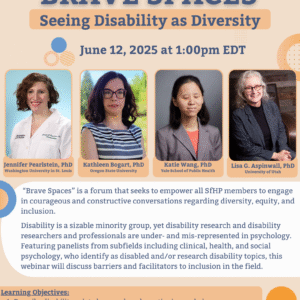SfHP: Antiracism and Cultural Humility in Pain Research and Clinical Care: A Women’s Health Perspective
$50.00
Society for Health Psychology Co-Sponsored Webinar
Presenter: Dr. Calia Torres
Calia Torres, PHD, Assistant Professor University of Alabama at Birmingham. Dr. Torres is an Assistant Professor at the University of Alabama at Birmingham, where she holds appointments in the School of Medicine – Hematology & Oncology, the O’Neal Comprehensive Cancer Center, and the Center for Clinical and Translational Science. With over 30 peer-reviewed publications, Dr. Torres is a grant-funded researcher and an active clinician specializing in non-pharmacological treatments for chronic illness management, particularly chronic pain and associated conditions. Her research integrates cultural humility and antiracism principles to address health disparities and improve access to equitable care, particularly for women from underserved communities. Dr. Torres is also a passionate advocate for systemic change, offering innovative strategies to advance diversity, equity, and inclusion in both clinical and research settings.
Overview:
This session will explore antiracism and cultural humility principles within the context of pain research and clinical care, offering strategies to address disparities affecting women’s health outcomes. Dr. Torres will provide a comprehensive overview of the RESTORATIVE model, an innovative framework that examines the intersections of racism, trauma, and chronic pain, and how these factors perpetuate inequities. The session will also highlight culturally responsive practices, the importance of reflexivity, and strategies for improving access to care for underserved populations, particularly women from marginalized communities.
Learning Objectives: Intended Audience:
- Describe the impact of racism and trauma on chronic pain and overall health in women from marginalized communities.
- Identify culturally responsive assessment tools and treatment interventions for addressing racial trauma in clinical care.
- Recognize barriers to care and strategies to enhance inclusion and equity in pain research and women’s health.
- Define cultural humility and reflexivity as essential components in advancing health equity
Attendees must attend the entirety of the program and complete the Evaluation sent after the program.
Description
Society for Health Psychology Co-Sponsored Webinar
Presenter: Dr. Calia Torres
Calia Torres, PHD, Assistant Professor University of Alabama at Birmingham. Dr. Torres is an Assistant Professor at the University of Alabama at Birmingham, where she holds appointments in the School of Medicine – Hematology & Oncology, the O’Neal Comprehensive Cancer Center, and the Center for Clinical and Translational Science. With over 30 peer-reviewed publications, Dr. Torres is a grant-funded researcher and an active clinician specializing in non-pharmacological treatments for chronic illness management, particularly chronic pain and associated conditions. Her research integrates cultural humility and antiracism principles to address health disparities and improve access to equitable care, particularly for women from underserved communities. Dr. Torres is also a passionate advocate for systemic change, offering innovative strategies to advance diversity, equity, and inclusion in both clinical and research settings.
Overview:
This session will explore antiracism and cultural humility principles within the context of pain research and clinical care, offering strategies to address disparities affecting women’s health outcomes. Dr. Torres will provide a comprehensive overview of the RESTORATIVE model, an innovative framework that examines the intersections of racism, trauma, and chronic pain, and how these factors perpetuate inequities. The session will also highlight culturally responsive practices, the importance of reflexivity, and strategies for improving access to care for underserved populations, particularly women from marginalized communities.
Learning Objectives: Intended Audience:
- Describe the impact of racism and trauma on chronic pain and overall health in women from marginalized communities.
- Identify culturally responsive assessment tools and treatment interventions for addressing racial trauma in clinical care.
- Recognize barriers to care and strategies to enhance inclusion and equity in pain research and women’s health.
- Define cultural humility and reflexivity as essential components in advancing health equity
Attendees must attend the entirety of the program and complete the Evaluation sent after the program.





Reviews
There are no reviews yet.